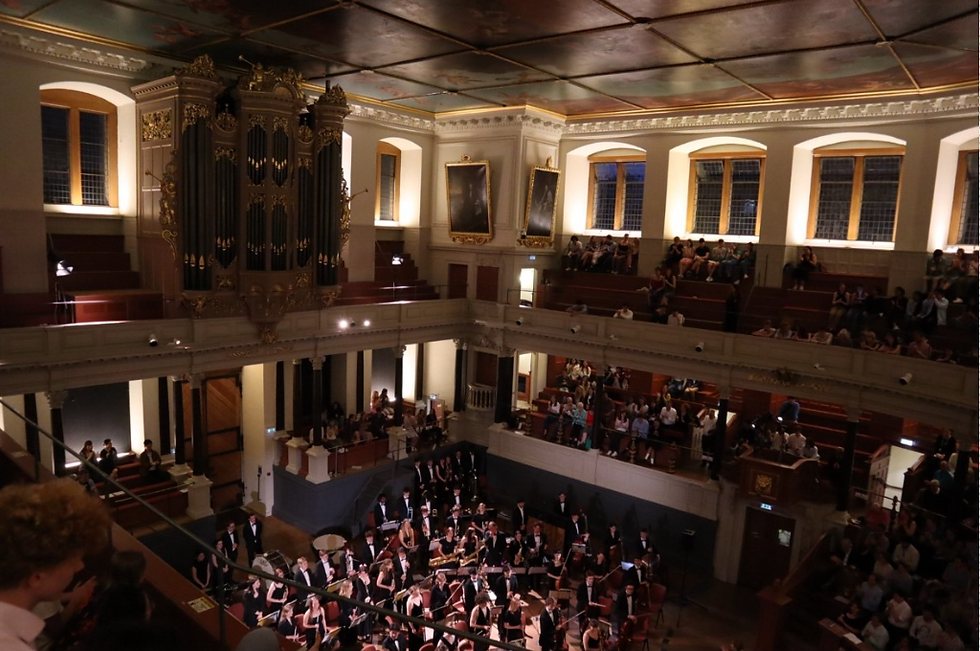This Year is Ultimately an Experiment
- Evie Brenkley

- Dec 1, 2020
- 4 min read
Ona Jarmalavičiūtė interviews Lucia Švecová, Conductor, Oxford University Wind Orchestra
Since its formation in 1974, the Oxford University Wind Orchestra (OUWO) has been run and conducted entirely by students. The orchestra gives woodwind, brass and percussion players the opportunity to perform in a successful, friendly and talented ensemble with a relaxed atmosphere and vibrant social life. Repertoire ranges from Paul Hindemith to Julie Giroux, from chamber music to concertos, and across a range of genres. This year the orchestra is going through an undeniable change. In this interview, the current conductor and music director of the orchestra Lucia Švecová delves into the reality of the situation and shares her hopes for the future.
Ona Jarmalavičiūtė: This year, professionally, must be very different for you. How has the orchestra spent this period?
Lucia Švecová: We have indeed been missing our weekly rehearsals and last term‘s performance opportunities. This is particularly sad for us, as OUWO prides itself in its friendly community spirit, which is inevitably harder to maintain in a virtual environment, although we have done our best with online socials.
Was OUWO part of any quarantine projects?
In Trinity term 2020 we worked on a remote recording of an original arrangement of four of Dvořák‘s Slavonic Dances, which can be viewed on YouTube. This challenge has taught us that being part of an orchestra is indispensable because learning and recording a piece individually is significantly more difficult. Through this recording we also got involved in the Oxford University Music Society’s outreach project for schools, where we filmed introductions to the piece, explaining orchestration and introducing individual instruments.
How has OUWO continued their rehearsals and performances?
Due to the difficulty of rehearsing repertoire individually, we have changed our approach and are trying to work on pieces together through video calls. This is still immensely difficult as there is no sound feedback due to latency. We were hoping to get together at least once in person and record a concert but sadly due to the lockdown we are currently working on another remote recording. The biggest difference is the repertoire, as there is only so much we can rehearse without sound feedback and only so much we can ask the players to record individually in their own room, which is always far more intimidating than playing together. Whilst usually we perform very exciting contemporary repertoire, during the pandemic we have had to look for less complex and more accessible pieces. Despite the weaknesses of the remote recording, the remote nature of these projects enabled our Assistant Conductor, Yundi Li, to join us from Singapore, as well as members in self-isolation to take part virtual rehearsals and socials.
How is the orchestra dealing with uncertainties about the future?
It is a big challenge, as usually a lot of planning for a concert needs to start very far in advance. This term we had to keep our options open, which is why we were quickly able to adjust to our in-person recording getting cancelled and instead work on a remote recording. I am very grateful to the understanding and hard-working committee which made it their priority to ensure that we are ready for any situation and that we reach out to any players who are coping less well with this uncertainty.
How could you describe your lifestyle as a musician? What elements of it challenge you the most?
The lifestyle of probably every musician and even more so with conductors can be generally described as always busy. Especially on a university musical scene, one always has to organise their own projects, as well as then actually spend time rehearsing the music, whilst studying or working alongside that, and that can be very strenuous. One term I was involved in two different orchestras as well as leading an opera production and an a cappella group, while simultaneously working on my finals coursework, and this was the greatest time-management challenge I have ever faced. However, if you love what you do and are committed to the projects you want to make happen, with the right proactive attitude, everything is manageable.
What do you value most in music performance?
I believe that the reason why we care about different musical performances is the personal and human nature of the interpretation, which alters the meaning of the music every time you hear it. In addition to that, what attracts me most to conducting is the way an orchestra has to work together and really feel and understand the music together, in order to be able to offer a coherent interpretation. In the whole process, I admire the sheer talent of each of the players and try to draw out the best they can do, whilst also listening to and working together with each other.
How do you listen to the music of others?
When listening to other interpretations of the same music, I listen out for specific meanings that different ensembles and conductors stress in their performance. When listening to new pieces of music, I try to listen in two phases: the first time I let myself become captured by the music and influenced by its emotional charge; the second time I try to notice the more technical details of how the music achieves that. Ultimately, any musical interpretation depends on how well you can work with these technical details to emphasise different features.
Are there any future projects for OUWO that you are excited about?
At the moment I am most looking forward to the next chance to rehearse and perform in person, whenever that may be. I have been writing down repertoire suggestions that I would love to perform for a long time now and I cannot wait to be able to perform them. Unfortunately, there is nothing more specific that we could be planning for given the current situation.







Comments